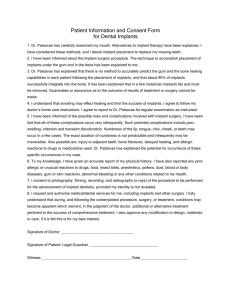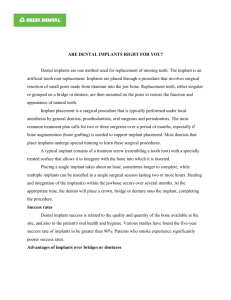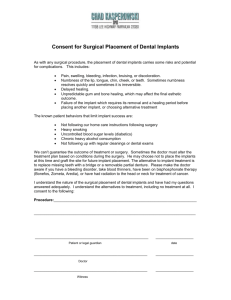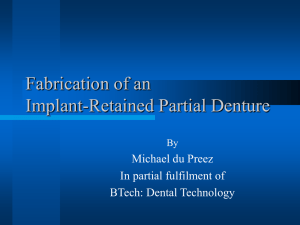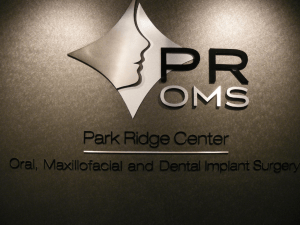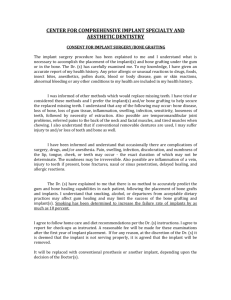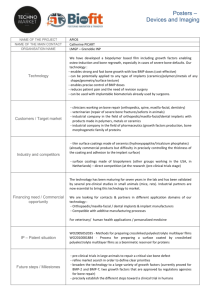A few announcements… - There is a Project Smile on friday! We will
advertisement
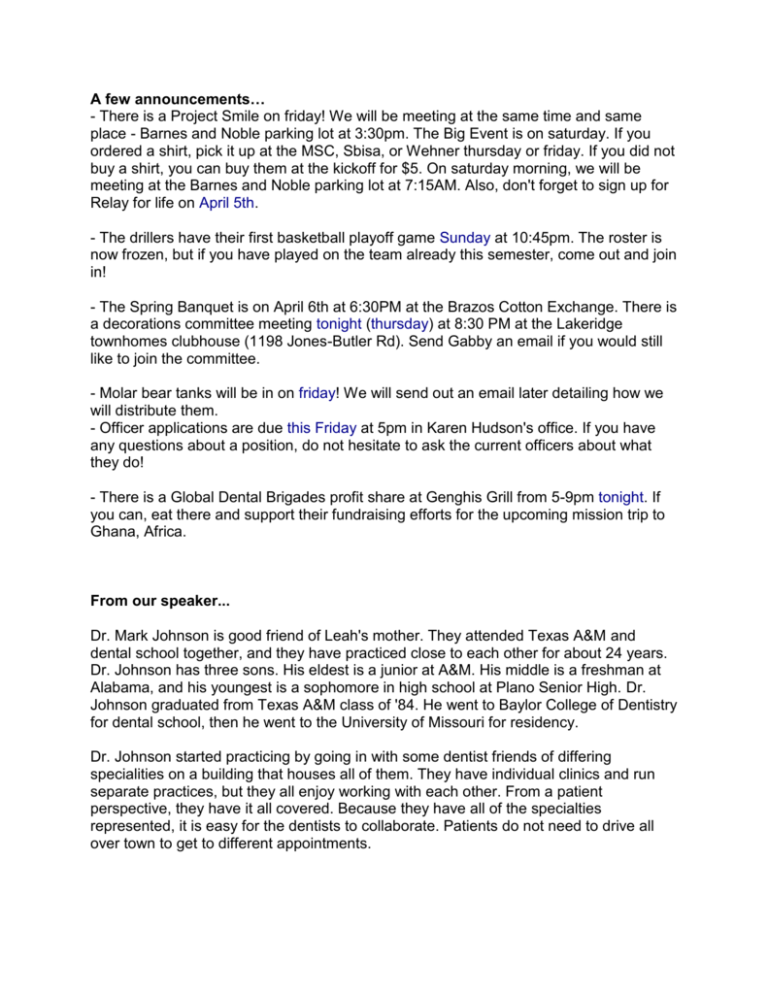
A few announcements… - There is a Project Smile on friday! We will be meeting at the same time and same place - Barnes and Noble parking lot at 3:30pm. The Big Event is on saturday. If you ordered a shirt, pick it up at the MSC, Sbisa, or Wehner thursday or friday. If you did not buy a shirt, you can buy them at the kickoff for $5. On saturday morning, we will be meeting at the Barnes and Noble parking lot at 7:15AM. Also, don't forget to sign up for Relay for life on April 5th. - The drillers have their first basketball playoff game Sunday at 10:45pm. The roster is now frozen, but if you have played on the team already this semester, come out and join in! - The Spring Banquet is on April 6th at 6:30PM at the Brazos Cotton Exchange. There is a decorations committee meeting tonight (thursday) at 8:30 PM at the Lakeridge townhomes clubhouse (1198 Jones-Butler Rd). Send Gabby an email if you would still like to join the committee. - Molar bear tanks will be in on friday! We will send out an email later detailing how we will distribute them. - Officer applications are due this Friday at 5pm in Karen Hudson's office. If you have any questions about a position, do not hesitate to ask the current officers about what they do! - There is a Global Dental Brigades profit share at Genghis Grill from 5-9pm tonight. If you can, eat there and support their fundraising efforts for the upcoming mission trip to Ghana, Africa. From our speaker... Dr. Mark Johnson is good friend of Leah's mother. They attended Texas A&M and dental school together, and they have practiced close to each other for about 24 years. Dr. Johnson has three sons. His eldest is a junior at A&M. His middle is a freshman at Alabama, and his youngest is a sophomore in high school at Plano Senior High. Dr. Johnson graduated from Texas A&M class of '84. He went to Baylor College of Dentistry for dental school, then he went to the University of Missouri for residency. Dr. Johnson started practicing by going in with some dentist friends of differing specialities on a building that houses all of them. They have individual clinics and run separate practices, but they all enjoy working with each other. From a patient perspective, they have it all covered. Because they have all of the specialties represented, it is easy for the dentists to collaborate. Patients do not need to drive all over town to get to different appointments. In the state of Texas, there are 3 dental schools. It is competitive right now. Class sizes are smaller than they used to be, because with dentistry you can make a good living and can also plan your family life. This was the reason Dr. Johnson did what he did. He wanted to be able to coach his kids in sports. In the medical world, a surgeon like him would be called in in the middle of the night for emergencies. This also makes dentistry a wonderful field for females. It is a great part-time, well paying profession for a woman who has a family. Periodontics deals with the gums. Dr. Johnson realized he didn't like doing crowns and fillings while he was in dental school. He likes periodontics because it is scientifically and surgically oriented. There is a spot for whatever you want to do in dentistry. Go in to dental school with an open mind and you will find what you want to do. His niche was surgery. Dr. Johnson showed us a series of pictures from some of his cases, and explained some of what periodontists do. Impacted cuspid tooth - A tooth came in very high in the mouth of a patient. He had to pull tissue back, expose it, and bind a bracket. He worked with an orthodontist on this case who made the space to pull the tooth down and in. This is a fairly common procedure done on early teens. There is a lot of crossover between what oral surgeons and periodontists do. Implants - These are done by periodontists and oral surgeons. An implant is a fake root. Surgeons need to mimic what the natural tooth would do. They have to align the implant perfectly between the bordering teeth and front to back. They use 3D technology to assist in placing the implants. The implants themselves are made of titanium, and a guide pin is used first to gage the depth. The implant is threaded all the way into the bone. The titanium does not get cavities or break and it helps preserve gums. Studies show that the implants last 52 years. The implants have an advantage over bridges because bordering teeth do not have to be drilled down at all. Periodontists and general dentists work together to provide care in implant cases. General dentists make the crowns, while the periodontist handles the rooting of the tooth. They work the case backward together before care starts. This type of work takes time. After they pull out a tooth, the bone graft takes months to heal. Then the periodontal work takes months to heal. If the periodontist can take a root out and place the implant in the same visit, it will save months of bone healing. During the healing process, patients must wear a retainer with a fake tooth. When he first started practice, periodontists had to place implants where the bone was. New research is always happening, and they can now grow the bone to place the implant wherever they need it to go. Things are constantly evolving. Even the implants themselves are changing. They now know that outside threaded implants preserve bone. Micro threaded implants have soft tissues attaching to them, which is a recent and ground breaking development. Frenectomy - The frenulum is a flap of elastic skin that can create recession of the gums. Surgeons sometimes must cut the fold out and do a gum graft to augment the area and stop recession. Gum Recession - When recession leads to exposed root, surgeons do connective tissue grafting. They use alloderm, which is freeze dried tissue. It is harvested dermis from a deceased person who has donated with body to science. The tissue is treated to remove the cells. Once it is placed in the patient's mouth, the patient's own cells will grow through it to fill it out. Bone Graft - Infection can damage the front wall of bone. Surgeons must graft bone into the mouth before an implant can be done. The area around the roots of molars is most susceptible to disease and the hardest to grow back. Bone graft material cones in synthetic, animal, human, coral sources. Materials are chosen based on patient preference. Dr. Johnson would personally choose human bone over any others. They can do bone grafts over implants to ensure the implant is fully in bone. An artificial wall of collagen is used to hold everything in place and the gums are sewn over it. The collagen will dissolves over the course of a few months. Recession around a Crown - The best to hope involves pushing the gums down. Human tissue will not attach to an artificial surface like the porcelain crown. Rampant decay - When there is decay all over a person's mouth due to negligence, it is hard to restore. By the time one crown is done, there is decay all around it. These are usually multifactorial cases. Sometimes taking all of the teeth out and doing implants is the best option. Pyogenic granuloma - This is a benign tumor of the gums usually seen with pregnancy, orthodontics, and trauma. Surgeons must cut it away and drain it. With time, it will heal into healthy gum tissue. Cancer - Periodontics involves pathology. Every bump in the mouth comes to periodontists. Most are benign, but some are cancers. Periodontists are the first to find cancer of the mouth. Dr. Johnson has had five cancer patients during his time in practice, and he lost two of them. Questions... How many procedures do you do in a day? My ideal day would have two surgeries in the morning, and three or four new patients in the afternoon. The time it takes to see a patient varies depending on the procedure. I have already had neck surgery partly because of dentistry. Dentistry is a hard profession, and posture means the world. I will have to quit due to physical limitations before mental limitations. When people get implants, can they still get braces? Yes. The implant will not move, but the other teeth can still move. The orthodontist and periodontist plan out the treatment before any procedures are done to make sure everything ends up in the right place. Is there any special coating on the titanium? Yes. It is treated, coated, and roughened to make a mechanical and chemical attraction with the mouth tissues, but the companies who make it will not tell you what it is.
